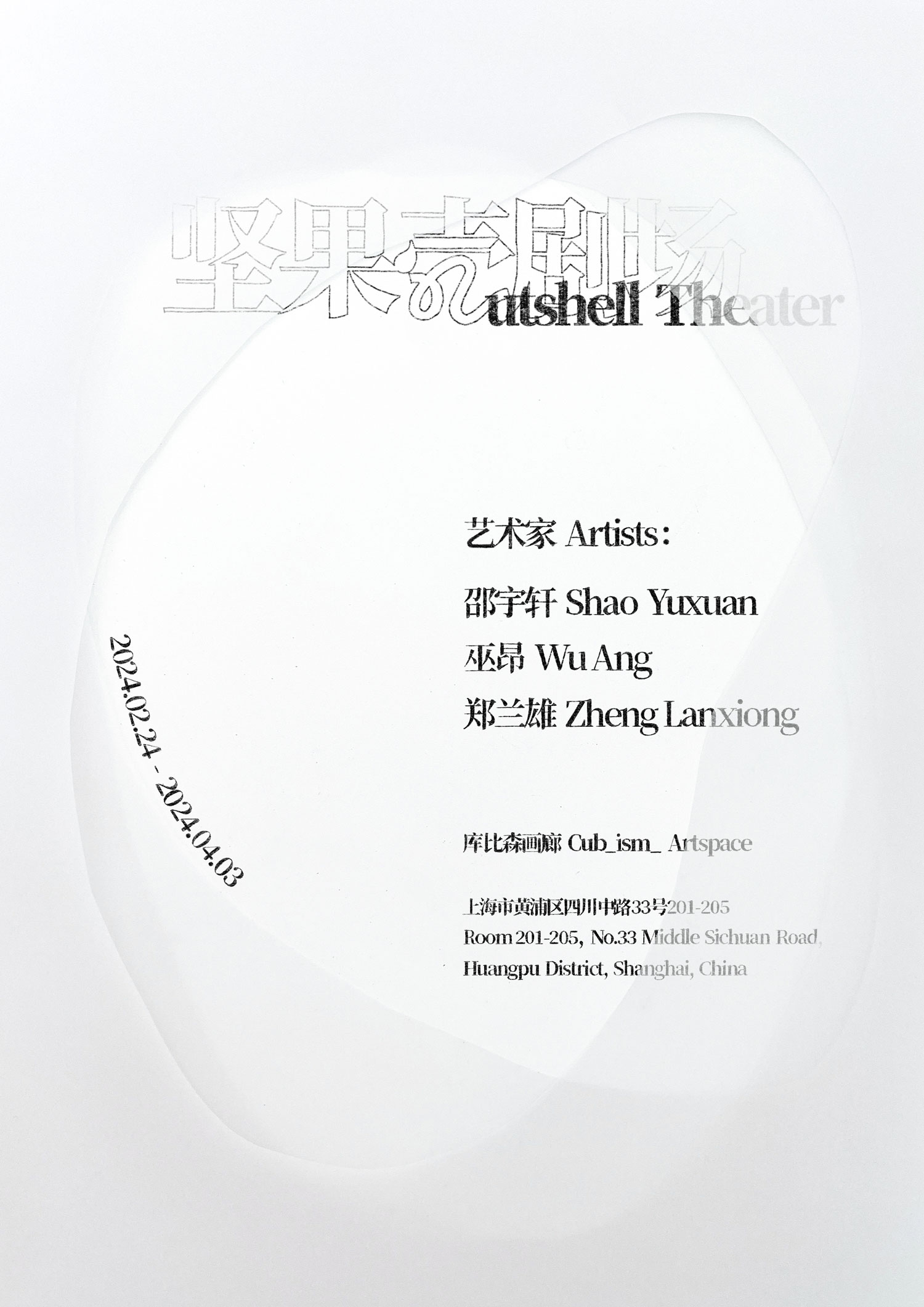展期 Period:
2024.2.24—2024.4.3
艺术家 Artist:
邵宇轩 Shao Yuxuan、巫昂 Wu Ang、郑兰雄 Zheng Lanxiong
地点 Venue:
前言 Introduction:
艺术家的情感、精力和创作中外延的可能性是有局限的。这里存在一个误区——通常我们认为“时间”(在这里可以把“时间”视作一切外部的实践和变迁)的冲刷虽可以带来弥足珍贵的经验填充空洞的核心(或许帮助了艺术创作的萌芽和发展),但同时也将其外壳打磨和固化,因而有不少艺术家笃定的将“突破那个逼仄封闭的场域”视为己任,渴求到达“每日精进一点,而后可以有为也”的状态——痛苦(此情感并非产生于因感觉到了局限性而倍感虚无,而是由于未能如愿达到某种臆想的境界所产生的愤恨怨气)和不够真实的艺术创作往往会伴随着这种颠倒的观念出现。应当接受的是,我们都是流水线上的“空心人”,“时间”是世界工厂为我们塑造外壳的固定流程,(管你是黄金壳还是钻石壳)我们的尽头是注定的。
“我们是空心人
我们是被塞满了的人”①
一旦发现这个荒谬的事实,我们就不难理解特蕾莎为什么会赤裸着在镜子面前寻找自己的灵魂藏于何处——艺术家同样如此,他们需要始终与“时间”的经验保持距离,哪怕他们依赖着它——也只有这样,艺术家方能在“人是有局限的”这样既定的命题下放弃追求无限的自由和扩张,转而从思考何以填满空壳变为追问以何填补“空心”。
然而这绝非易事,甚至直接有悖于镌刻在人类基因里的渴望超越的天性,可以视为一种苦修。莎士比亚在《哈姆雷特》里写道——“啊,上帝,即便我困在坚果壳里,我仍以为自己是无限空间的国王。”看似苦中作乐的台词实际上为艺术家们提供了一条可行的通道,即使无法突破“坚果壳”,在方寸天地之间照样可以搭建舞台,自我立足,从而避免被外部的压力消解——展览名“坚果壳剧场”亦是受此启发而来(并非是德勒兹“哲学剧场”理论的衍生)——这几乎是一种明喻,艺术家们试图理解并且诠释他们的生活——从一个过去的自我到今天的自我,这是怎样一种经验上的浓缩——全都要放到“坚果壳剧场”的正中央循环表演。
此次展览中三位背景完全不同的艺术家都戏剧性地用具象的方法在小尺寸的画布或装置中表露他们对于“图像”的理解。过去更多作为诗人和小说家的巫昂将书本中的王国转移到了她的绘画中,恰恰与阿改所言的“完全没有野心勃勃的样子”相反,巫昂在踏入这个领域的初始阶段就已经极为自然地越过了“暧昧与试探”的阶段,一个个怪异的人物迫不及待地登上剧场,像是小说中(包括不存在的小说)一行行文字幻化的形象,一气呵成——巫昂悬置自我,借着对于他人故事的书写与描绘来填充自己的剧本。郑兰雄的观看视角则更为集中且谨慎,犹如管中窥豹,却又总能准确地抓住并且复现生活的微妙之处。图像作为他创作的切入点但并不重要——郑兰雄从不刻意追求对图像的诠释或者外扩,他看中的是个人的生活经验和情感纽带。邵宇轩(木一)对创作保持着警惕,同时也存在一种预先准备好的对抗——他用符号化的创作抵御符号,也在对图像的阐释中反对阐释——这是更为野蛮的方式,阐释在今天让艺术变得更加温顺可控,拒绝把艺术作品变成别的什么东西方可使艺术作品作为独立的存在。与千篇一律的“坚果壳”相比,有限的“剧场”中艺术家们填充“空心”的形式虽不同但各自鲜活。
“随着年龄的增长,他的偏执逐渐消失,却以包容的心态怀疑地看待眼前的一切。他坐在木偶剧场的台下,在黑暗里看着它们比武、争奇斗艳、装腔作势、悔过认错,通过它们认识到自己的愚蠢。”②
文/Leslie Dong
①出自Thomas Stearns Eliot The Hollow Men(中译见托·斯·艾略特,《荒原》,汤永宽,裘小龙 等译,上海:上海译文出版社,2012年)
②出自Czesław Miłosz Piesek przydrozny(中译见切斯瓦夫·米沃什,《路边狗》,赵玮婷译,广州:花城出版社,2017年)
There are limits to the artists’ emotions, energy and creative possibilities. There is a misunderstanding here - it is often assumed that the wash of 'time' (which in this case, ‘time’ can be seen as all external practices and transformations), although it can bring valuable experience to fill the empty core (perhaps helping the germination and development of artistic creation), at the same time, it also polishes and solidifies its shell. Thus many artists are determined to "break through that cramped and closed field" as their own responsibility, and aspire to reach the state of "a little bit of refinement every day, and then they can do something.” "Pain (which is not a feeling of emptiness due to a sense of limitation, but rather resentment due to the failure to achieve a certain imaginary realm) and less-than-realistic artistic creations are often accompanied by such inverted perceptions. It should be accepted that we are all "hollow men" on an assembly line, that "time" is the fixed process by which the world factory mould us into shells (whether gold or diamond) and that our end is predetermined.
“We are the hollow men
We are the stuffed men”
Once we realize this absurdity, it is not difficult to understand why Tereza searched naked in front of a mirror to find out where her soul was hidden - the same is true for artists, who need to distance themselves from the experience of "time" even if they depend on it! - Only in this way can the artist give up the pursuit of infinite freedom and expansion under the established proposition that "human beings have limitations", and instead change from thinking about how to fill the empty shell to asking how to fill the "hollow".
However, this is never easy, and even against the nature of the desire for transcendence that is engraved in human genes directly, it can be seen as a form of asceticism. Shakespeare wrote in Hamlet - "O God, I could be bounded in a nutshell and count myself a king of infinite space, were it not that I have bad dreams." The seemingly bittersweet lines actually provide a feasible channel for artists, even if they cannot break through the "nutshell", they can still set up a stage and stand on their own feet, so as to avoid being dissolved by external pressures. The title of "Nutshell Theater” which is inspired by this (not a derivative of Deleuze's "Philosophical Theatre" theory) - it's almost a clear metaphor for the artists' attempt to understand and interpret It is almost a metaphor for the artists' attempts to understand and interpret their lives - from a past self to today's self, what an experiential condensation - all to be put into a circular performance in the middle of the "Nutshell Theater”.
In this exhibition, three artists with completely different backgrounds dramatically use figurative methods to express their understanding of "image" in small-sized canvases or installations. Wu Ang, who used to be more of a poet and novelist, transfers the realm of books to her paintings. Contrary to agai’s statement that she is "not ambitious at all", Wu Ang has already naturally passed the stage of "ambiguity and temptation" at the initial stage of her entry into this field. "One by one, the strange characters can't wait to get into the theatre, like images conjured up from lines of text in novels (including non-existent novels), Wu Ang suspends herself and fills out her own script by writing and depicting other people's stories. Zheng Lanxiong's perspective is more focused and discreet, like a peephole in a tube, however he always able to accurately capture and reproduce the subtleties of life. Images serve as an entry point for his work, but they are not important - Zheng Lanxiong never deliberately seeks to interpret or expand images, but rather focuses on his personal life experiences and emotional ties. Shao Yuxuan (木一) is wary of creation, but there is also a pre-prepared confrontation - he uses symbolic creations to resist symbols, and also opposes interpretation in his interpretation of images - this is the more barbaric approach, as interpretation today makes art more docile and controllable, refusing to turn the artwork into something else in order to make it exist as an independent. In contrast to the uniformity of the "nutshell", the forms in which artists fill the "hollow" in the limited "theater" are different but vivid.
“Time-tempered ferocity, but with tolerance increased all-embracing doubt.
He sat in the darkness in front of the puppet theatre and watched the chases, prayers, puff and subservience, while recognizing his own stupidity.”
Text by Leslie Dong
①Eliot, T·S. (2012). The Hollow Men. Shanghai: Shanghai Translation Publishing House.
②Miłosz, C. (2017). Piesek przydrozny. Guangzhou: Flower City Press House.

